Presidential Candidate Slammed for Claiming Credit for Iranian Oil Sales
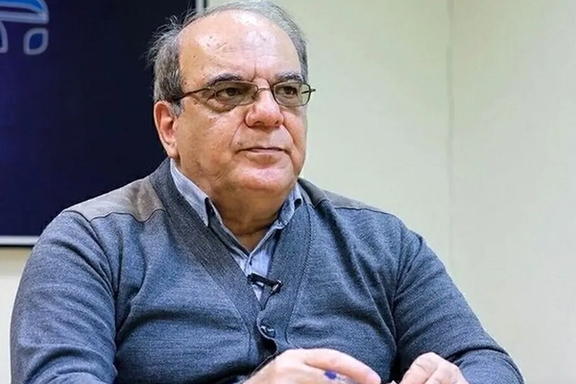
Presidential candidate Saeed Jalili has been slammed for claiming that his advice was responsible for boosting Iran's oil sales.

Presidential candidate Saeed Jalili has been slammed for claiming that his advice was responsible for boosting Iran's oil sales.
Reformist Abbas Abdi responded to the presidential aspirant by emphasizing that the credit for eased restrictions on Iran's illicit oil exports belongs not to Jalili’s intervention but to external political changes, specifically under Biden's administration. Since Joe Biden took over, Iran is said to have generated at least $88bn in oil revenue, in spite of sanctions designed to cripple Iran's commercial power.
According to figures released by Kpler, an industry analyst, Iran's oil exports have seen a substantial increase, rising from 350,000 barrels per day (b/d) in 2020 to approximately 1.5 million barrels per day (mb/d) in the first half of 2024.
However, due to the sanctions which have been levied for Iran's nuclear program, support of terror groups, human rights abuses and support of Russia's war on Ukraine, the growth in export volumes has not seen a proportionate rise in oil sale revenues.
As Iran approaches its snap presidential election on June 28 following the death of President Ebrahim Raisi in a helicopter crash in May, the six final candidates, five of whom are known to be close to Supreme Leader Ali Khamenei, are ramping up their campaigns with an array of propaganda tactics as they vie for the presidential seat.
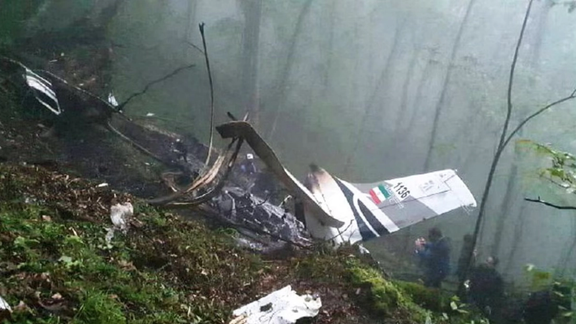
More than 200 cases have been filed against Iranians amid the continued crackdown on celebrations of the death of President Ebrahim Raisi last month.
Mohammad Mousavian, Isfahan's Revolutionary Prosecutor, cited "spreading falsehood and offensive content" and "destabilizing society's psychological stability" as grounds for legal action against the reactions to the sudden death of the President in a helicopter crash during a Presidential visit.
The judicial official said the accused were guilty of "creating, publishing, and republishing falsehood on social networks" and announced "decisive judicial action" against them as "disturbers of the psychological security of society."
After the helicopter crash which also killed the President's delegation, including the foreign minister, many Iranians living inside and outside the country rejoiced and shared their often humorous comments on social networks.
Raisi's death memes and jokes reflected the dire legitimacy crisis that has plagued the establishment under Raisi's oppressive policies which many blame for the economic catastrophe plaguing Iran today.
Iranian authorities, particularly the cyber police, have come down hard on expressions of dissent, escalating surveillance efforts and issuing numerous summonses and legal referrals.
In Kerman province alone, the prosecutor's office disclosed the identification and subsequent disciplinary action of 288 social media users on charges related to societal disruption.
Shaghayegh Mohammadi, the spouse of Esteghlal FC player Mohammad Hossein Moradmand, found herself among those targeted following the posting of a poem by Iranian poet Hafiz, which alludes to the downfall of oppressors.
The legal actions have drawn criticism from entities such as the Iranian Writers' Association, which condemned the suppression of freedom of expression and emphasized the universal right to unhindered speech.
The dire state of freedom of expression in Iran has also been highlighted by Amnesty International, whose 2024 report detailed an unprecedented level of censorship and repression by Iranian authorities, mainly targeting women and dissenting voices.
The report underscores a systematic campaign to stifle fundamental human rights, including freedom of expression, association, and peaceful assembly, through various means such as censorship, satellite channel jamming, and social media platform blocking.
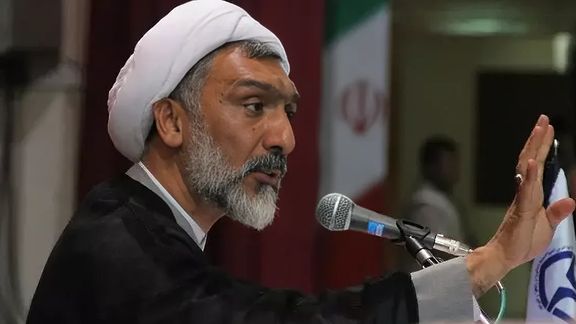
Iranian presidential candidate Mostafa Pourmohammadi has vowed to end the practice of internet bans, likening the internet to "the water for life" and acknowledging the disruption caused by current censorship.
Pourmohammadi committed to appointing a minister dedicated to "ending the VPN game and guaranteeing the security of users" after widespread bans on the likes of social media and dissident websites has cut swathes of Iran off from the digital world. Many have been forced to use virtual private networks (VPNs) to bypass the bans which have worsened in the wake of Iran's uprising since 2022.
Pourmohammadi's remarks have sparked controversy among Iranians who are skeptical of his sudden advocacy against internet censorship.
One user pointedly remarked on social media platform X, "Do you only remember filtering during election time?"
Further exacerbating concerns is the recent movement in the Iranian parliament to reintroduce a bill last month that could further tighten internet controls, ostensibly aimed at "protecting cyberspace users" but likely to deepen social repression.
Iran's approach to internet censorship has been a contentious issue for over two decades, with routine blocking of websites and social media applications. Many Iranians bypass the restrictions using VPNs and other tools but the government's measures have grown more severe, especially following the nationwide protests triggered by the death of Mahsa Amini in morality police custody in September 2022.
In response, the government blocked major internet services like Instagram and WhatsApp which massively affected the country's SMEs where ecommerce was an essential means of survival, especially those in rural Iran.
Freedom House has ranked Iran 11/100 for internet access, calling it "not free" in its 2023 report, noting the crackdowns following 2022's uprising.

As the state-controlled presidential election gets underway, Iran’s six handpicked candidates begin a mud slinging war on televised debates with accusations from corruption to human rights abuses.
In a Wednesday interview, Tehran's mayor, Alireza Zakani, highlighted his “successful tenure” and emphasized his “relentless efforts to uncover and address pervasive corruption” among officials across various institutions, from the government to parliament.
The ultra-conservative candidate portrayed himself as a determined fighter against corruption, particularly targeting "those in power who enjoy special protection”, in spite of having been one of the main proponents for the violent crackdown on hijab violators in the capital.
"I have always said that we should start with the most powerful people with clear-cut boundaries separating them," he asserted. "Those in power should safeguard people’s lives and wealth, but this is not always the case."
Zakani pointed out that corruption is prevalent among "reformists and fundamentalists [conservatives]," though to varying degrees. He even cited an example involving someone from the Revolution's inner circle who shared the same faction as himself.
However, he alluded to corruption during the previous municipality administration and said he has “salvaged substantial funds from corruption cases,” a comment that could hint at Mohammad Bagher Ghalibaf, another presidential candidate's, 12-year tenure as Tehran's mayor.
The capital's municipality, a hotbed of corruption, was marred by significant financial mismanagement during Ghalibaf's mayoral tenure, who is now parliament speaker.
His successors revealed a staggering figure, claiming that over $5 billion was either misappropriated or wasted from 2005 to 2017. Despite numerous accusations of financial corruption against Ghalibaf, he was not investigated or accused of wrongdoing, which many attribute to his close relationship with Supreme Leader Ali Khamenei.
Meanwhile, Zakani's tenure in Tehran has also been controversial. It included a scandal involving approximately $336 million that went missing. He also faced criticism for appointing his deputy for financial affairs as the head of his campaign team, raising concerns about the misuse of municipal resources for personal political gain. The move is seen as an ethical violation, if not an infringement of campaign laws.
Zakani's remarks on corruption among powerful officials come amid warnings to presidential candidates not to tarnish the country’s image. These warnings include threats of broadcast suspension, part of a broader crackdown on media content preceding the elections.
The directive emphasizes the need for candidates to avoid defamation and behaviors detrimental to national unity and civic engagement.
In another televised interview, Ghalibaf expounded upon his prospective initiatives in the event of his electoral success, affirming his advocacy for whistleblowing, which he claimed he previously institutionalized during his parliamentary tenure. He promised incentives, including financial remuneration for those who come forward with information.
The claims come amid the arrest of Yashar Soltani and Saba Azarpeik, esteemed figures within Iranian journalism renowned for their relentless exposés on corruption
Soltani, who endured imprisonment in 2019 for his investigations into financial malfeasance within the Tehran Municipality under Ghalibaf's stewardship, now faces further legal ramifications. Also, Azarpeik's spouse intimated that Ghalibaf had instigated legal proceedings against her.
Mostafa Pourmohammadi, also vying for the presidency, voiced his commitment to “safeguarding the rights of the accused and prisoners.” in his promotional address aired on TV. However, his candidacy is overshadowed by his association with the infamous Death Commission alongside the late President Ebrahim Raisi, implicated in the authorization of the mass execution of thousands of political dissidents in 1988, a legacy that is still vivid among many Iranians.
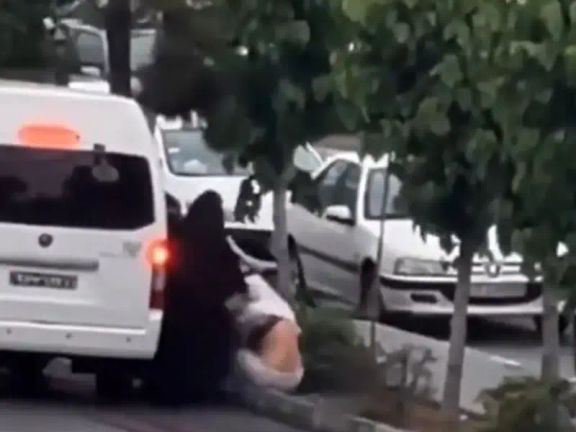
Iran's Minister of Interior praised the brutal enforcement of the radical hijab regulation under the recent 'Noor' plan as one of the police's "greatest honors."
Ahmad Vahidi said the police actions in implementing the plan which have included violent beatings and sexual assaults, were in line with "protecting the family."
Since its initiation on April 13, the hijab crackdown has worsened under the legislation which came from a mass rejection of the Islamic dress code in the wake of the 'Women, Life, Freedom' movement sparked by the death in policy custody of Mahsa Amini in 2022.
Meanwhile, Major General Mohammad Bagheri, Chief of the General Staff of the Armed Forces, claimed that the Noor plan was implemented with "minimal controversy", in a bid to undermine the global criticism that has ensued.
The rhetoric comes as the controversial "Protection of Family Through Promotion of Hijab and Chastity Culture" bill moves closer to becoming law. Despite requiring additional reviews after being initially rejected by the Guardian Council, the ultimate legislative authority, the bill’s harsh regulations are already being enforced.
Women now face heightened risks, including arrest and travel bans for non-compliance with hijab mandates, and exclusion from public spaces and services.
The morality police have reasserted their presence on the streets with renewed vigor, particularly in Tehran’s central districts, following a period of reduced activity after the uprising which began in September 2022.
Critics argue that such measures represent a deeper entrenchment of authoritarianism, with the police and judiciary increasingly infringing on individual rights and freedoms.
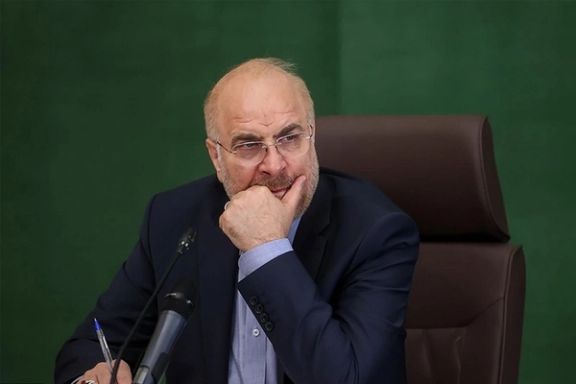
The reformist newspaper Ham-Mihan has called out the Speaker of the Iranian Parliament for his presidential election campaign rhetoric concerning Afghan migrants.
Mohammad Bagher Ghalibaf recently promised that "provisions have been made for the complete expulsion" of illegal immigrants while numbers have continued to grow with around eight million in the country.
Ham-Mihan voiced a question: "If this issue is so important that it requires promises to win votes, then why haven’t you presented any ideas, opinions, or serious critiques about it in the past four years, and why haven’t you pursued and implemented the issue in any of the institutions where you were present? Is this way of making promises a sign of sincerity?"
The timing of Ghalibaf's statements coincides with a surge in the detention and expulsion of foreign nationals, particularly Afghan citizens, from Iran. This has sparked a complex debate among Iranian citizens and officials, balancing the perceived threats and opportunities presented by the presence of Afghan migrants.
Despite the approximate figure of 780,000 Afghans in Iran with official refugee status, the majority remain undocumented, a significant number seeking refuge from the instability in Afghanistan, particularly following the resurgence of the Taliban.